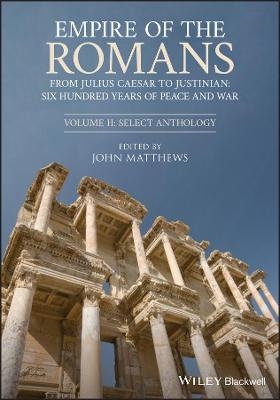
Empire of the Romans
Wiley-Blackwell (Verlag)
978-1-4443-3458-6 (ISBN)
Empire of the Romans: From Julius Caesar to Justinian: Six Hundred Years of Peace and War, Volume II: Select Anthology is a compendium of texts that trace the main historical changes of the empire over six hundred years, from the death of Julius Caesar to the late Middle Ages. The second volume of Empire of the Romans, from Julius Caesar to Justinian, this anthology balances literary texts with other documentary, legal, and epigraphic sources. Acclaimed author John Matthews presents texts that reflect individual, first-person experiences rather than those from historians outside of the time periods of which they write.
Each selection includes an introduction, annotations on points of interest, author commentary, and suggestions for further reading. Excerpts are organized thematically to help readers understand their meaning without requiring an extensive knowledge of context. Six sections—running in parallel to the structure and content to Volume I—explore the topics such as the building of the empire, Pax Romana, the new empire of Diocletian and Constantine, and barbarian invasions and the fall of the Western Empire. Selected texts span a wide array of subjects ranging from political discourse and Roman law, to firsthand accounts of battle and military service, to the civic life and entertainment of ordinary citizens. This volume:
Covers a vast chronological and topical range
Includes introductory essays to each selected text to explain key points, present problems of interpretation, and guides readers to further literature
Balances the different categories and languages of original texts
Enables easy cross-reference to Volume I
Minimizes the use of technical language in favor of plain-English forms
Whether used as a freestanding work or as a complement to Volume I, the Select Anthology is an ideal resource for students in Roman history survey courses as well as interested general readers seeking a wide-ranging collection of readings on the subject.
JOHN MATTHEWS is Professor Emeritus of Classics and History, Yale University, USA. He received his PhD from Oxford University in 1969 and taught Greek and Roman history at Oxford for many years before moving to Yale in 1996. He was elected Fellow of the British Academy in 1990. He is author of many books including Western Aristocracies and Imperial Court, A.D. 364-425, The Roman Empire of Ammianus,??Laying Down the Law: A Study of the Theodosian Code, and Roman Perspectives: Studies in the social, political and cultural history of the First to Fifth Centuries. He is also co-author of the acclaimed Atlas of the Roman World.
Preface xi
List of Figures xv
Part I Building an Empire 1
1 Contests of the Powerful: Appian: Civil War 3
2 A Roman Senator Mourns His Wife: “Laudatio Turiae” (inscr., Rome) 7
3 An Architect’s Profession: Vitruvius: On Architecture, Preface 15
4 Past and Present in Augustan Poetry: The Battle of Actium in Vergil’s Aeneid, 8.671–731 19
5 The Authorized Version: Augustus: Res Gestae 23
6 The Secular Games 29
6.1 Zosimus: New History, 2.5–6 30
6.2 Inscriptions on the Conduct of the Games 32
6.3 Q. Horatius Flaccus: Carmen Saeculare 35
7 An Admirer of Tiberius: Velleius Paterculus: History of Rome, 2.101–7 39
8 An Embassy to Caligula: Philo: Legatio ad Gaium 45
9 Victims of Tyranny 51
9.1 The Death of Seneca in Tacitus’ Annals, 15.60–5 52
9.2 Lucan the Poet: Suetonius, Life of Lucan 54
10 Episodes from the Last Years of Nero 57
10.1 Tiridates at Rome: Cassius Dio/Xiphilinus, 63.1–7 58
10.2 The Grand Tour of Hellas Cassius Dio/Xiphilinus, 63.14–21 59
10.3 Nero: The Liberation of Hellas (inscr. from Akraiphia, Boeotia) 62
11 Plautius Silvanus, Legate of Moesia: Funerary elogium from Tibur (inscr.) 67
Part II Pax Romana: “A Polite and Powerful Empire” 69
12 The Life and Death of the Elder Pliny 71
12.1 Pliny: Ep. 3.5 to Baebius Macer 72
12.2 Pliny: Ep. 6.16 to Cornelius Tacitus 74
13 Conduct of a Philosopher: Epictetus: Discourses 77
14 Scenes from Metropolitan Life: Martial: Selected Epigrams 81
14.1 The Colosseum 83
14.2 Snow in the Amphitheatre 83
14.3 Gladiatorial Combat 83
14.4 Animals in the Arena 84
14.5 Cruel and Unusual Punishment 84
14.6 The Devastation of Vesuvius 84
14.7 The Palace of Domitian 85
14.8 A Roman Suicide 85
14.9 A Lamented Dancer 86
14.10 Imperial Patronage and the Success of a Poet 86
14.11 A New Emperor 86
14.12 Pliny the Orator 87
14.13 A Poet’s Life 87
14.14 Juvenal the Satirist 88
15 Civic Life at Ephesus 91
15.1 Ulpian: De Officio Proconsulis 93
15.2 The Sophist Damianus: Philostratus, Lives of the Sophists 94
15.3 A Disruptive Visitor: Acts of the Apostles, 19.7–41 95
15.4 Inscriptions of Ephesus 97
15.5 Inscriptions of Perge 99
16 Public Life and Occupations: Artemidorus: Oneirocritica 103
17 A Career Choice: Lucian of Samosata: The Dream 107
18 Labor Costs in Diocletian’s Edict on Maximum Prices 113
18.1 Trades and Occupations: Edict VII 114
18.2 Prices of Slaves: Edict XXIX 116
19 Games and Entertainments 117
19.1 Two Epitaphs of Gladiators (inscrs. from Milan, Verona) 117
19.2 A Record‐Breaking Charioteer: G. Appuleius Diocles (inscr., Rome) 118
20 A Visit to the Country: The Souk el-Khmis Inscription 123
21 Traveling to Court in the Digest: Gaius and Ulpian: Provincial Edict 127
21.1 Gaius: Provincial Edict, Book 1 128
21.2 Ulpian: Provincial Edict, Book 74 129
22 Sea Journeys and Shipwrecks 131
22.1 Lucian: The Ship 131
22.2 Letter from a Crewman (Papyrus) 134
22.3 The Sailing Season: Vegetius and the Theodosian Code 134
23 Life in the Armed Forces 137
23.1 A Soldier’s Day of Glory (inscr., Philippi) 137
23.2 Hadrian Addresses the Troops (inscr., Lambaesis/Vescera) 138
23.3 A Tour of Inspection: Arrian’s Circumnavigation of the Black Sea 141
23.4 A Legionary Surveyor and Engineer (inscr., Lambaesis) 146
23.5 Joining the Navy: Recruits Write Home (Papyrus Letters) 148
23.6 Retirement from the Army (Inscribed Diploma) 149
23.7 A Soldier Makes his Will (Papyrus Document) 151
24 Religion, Philosophy, Science 155
24.1 Apuleius and the Goddess Isis 155
24.2 Aelius Aristides and the God Asklepios 160
24.3 A Chapter of Accidents: Fronto and Marcus Caesar 164
24.4 Galen’s Prognosis 168
24.5 Marcus Aurelius Antoninus: “To Himself ” 173
25 Crime and Punishment in the Jurists: Justinian, Digest: Ulpian, Callistratus, Paul 181
26 A Hearing before the Proconsul: Acts of the Scillitan Martyrs 187
Part III Rising to the Challenge 191
27 A Witness to His Age: Cassius Dio’s History 193
27.1 The Last Days of Commodus, 73.14–23 193
27.2 The End of the History, 80.1–5 197
28 The Great King Blows the Trumpet: Monumental Inscription from Naqsh-e Rustam, Fars 201
29 Prophecy and History in the Third‐Century East: The Thirteenth Sibylline Oracle 207
30 The Aftermath of Invasion: Gregory Thaumaturgus: Canonical Letter 213
31 A Philosopher’s Circle: Eunapius: Lives of the Sophists 217
32 The Herulian Attack on Athens: Dexippus: Scythica 221
33 The Martyrdom of Cyprian 223
33.1 Cyprian: Letters 224
33.2 Acta Cypriani 226
34 Christian Persecutions in the Papyri: Certificates of Sacrifice from Theadelphia and Oxyrhynchus 229
34.1 The Sacrifice Test 230
34.2 Declaration of Church Property 231
35 Maximinus and the Christians: Eusebius: Ecclesiastical History with inscr. from Colbasa 233
36 Legal Proceedings before the Consularis Numidiae: Optatus of Milevis: Appendix I 237
Part IV A New Empire 243
37 Diary of an Official: Papyrus from Oxyrhynchus 245
38 Cities of Constantine (1): Constantinople, “New Rome” 249
38.1 Zosimus: New History, 2.29ff 251
38.2 Chronicon Paschale 253
39 Cities of Constantine (2): Rome: The Liber Pontificalis 257
40 Cities of Constantine (3): Jerusalem: Eusebius on the Church of the Holy Sepulchre 267
41 A Question of Civic Status: Orcistus and Nacolia (inscr. from Orcistus) 273
42 The Philosopher and the Politician: Sopatros and Ablabius: Eunapius: Lives of the Sophists 277
43 Tribulations of an Officer: Papyri from the Abinnaeus Archive 281
44 On Their Majesties’ Service 287
44.1 The Emperor Restores a Reputation (inscr.) 287
44.2 Obelisks’ Tales (inscrs.) 289
45 Warfare and Romance on the Tigris Frontier 293
45.1 An Officer in the Field (Ammianus Marcellinus, 18.6–8) 294
45.2 The Wife of Craugasius (Ammianus Marcellinus, 18.10, 19.9) 299
46 An Adventure in the Desert: Jerome: Life of Malchus 303
47 Julian and the Platonists: Eunapius: Lives of the Sophists 311
48 The Conduct of a Priest: Julian: Letter to a Priest 317
49 A Letter from Hierapolis: Julian: Letters 323
50 The Surrender of Nisibis 327
50.1 Ammianus Marcellinus, 25.8.13–9.6 328
50.2 Ephraim of Nisibis: Third Hymn against Julian 329
51 Pagan and Christian Virtues in the Roman Aristocracy 335
51.1 Vettius Agorius Praetextatus) (inscr., Symmachus) 335
51.2 Sextus Petronius Probus (inscr., Ammianus Marcellinus, Symmachus) 339
52 The Last Days of Monica: Augustine: Confessions, 9.23–33 345
53 Their Majesties’ Voice: Selections from the Theodosian Code 351
53.1 The Imperial Image 352
53.2 Enemies of the State 353
53.3 The Conduct of Business 354
53.4 Custody of Accused Persons 355
53.5 Amnesties 356
53.6 Legal Holidays 357
53.7 Marriage, Sex, and the Family 358
53.8 Christianity and Legal Custom 362
53.9 Christianity and the Historic Past 364
Part V Facing the Future 367
54 The Life and Work of Ulfila 369
54.1 Philostorgius: Ecclesiastical History 370
54.2 Jordanes: Getica 372
54.3 The Letter of Auxentius 372
55 The Origin of the Huns: Jordanes: Getica 375
56 The End of a Way of Life: Paulinus of Pella: Eucharisticon 379
57 Returning Home: Rutilius Namatianus: De Reditu Suo 385
57.1 Palladius and Exsuperantius, 1.205–16 386
57.2 Victorinus, 1.491–510 387
57.3 Protadius, 1.541–58 387
58 Founding a City of God: Claudius Postumus Dardanus (inscr., Sisteron) 389
59 At the Royal Court of Attila 391
59.1 An Embassy to Attila in Priscus’ History 392
59.2 Attila’s Banquet in Priscus’ History 397
59.3 The Death of Attila in Jordanes’ Getica 398
60 The End of Roman Noricum: Scenes from Eugippius: The Life of St. Severinus 403
60.1 Arrival and Early Career of Severinus 405
60.2 Queen Giso and the Goldsmiths 407
60.3 Batavis and other Towns 408
60.4 The Loss of Lauriacum 410
60.5 Death of Severinus and Evacuation of Noricum 411
60.6 Deposition of Severinus at Naples 413
61 Public Business (1): Theodosian Code: “Gesta Amplissimi Senatus” 415
62 Public Business (2): Acts of the Council of Chalcedon 421
63 A Hall of Mirrors: Ostrogoth and Roman at the Court of Ravenna 427
63.1 Cassiodorus’ Variae, 1.45–6 427
63.2 Boethius: Consolation of Philosophy 430
64 Emperor and People at Byzantium: The Nika Riot 441
64.1 Procopius: Wars, 1.24 443
64.2 “Acts against Calapodius”; Theophanes: Chronographia 443
64.3 Malalas: Chronicle 446
64.4 Chronicon Paschale 447
65 Confirmation of the Digest: Justinian: Constitutio “Tanta” 453
66 Recovering the West in Procopius 457
66.1 Syracuse: Wars, 3.14 458
66.2 Lepcis Magna: Buildings 6.4 459
66.3 Rome: Wars 5.18 460
Part VI Epilogue: Ruins of a Roman Landscape 463
67 The Lost Pleasures of a Hot Bath: Theodosian Code and Breviarium 465
68 Venetian Origins?: Cassiodorus: Variae, 12.24 467
69 Accident in a Derelict Amphitheater: Parasteis Syntomoi Chronikai 469
70 “The Works of Giants”: Anglo-Saxon Poem: The Exeter Book 471
71 “Maumbury Rings”: Thomas Hardy: The Mayor of Casterbridge 475
Bibliographical References 479
Index 489
| Erscheinungsdatum | 25.02.2021 |
|---|---|
| Verlagsort | Hoboken |
| Sprache | englisch |
| Maße | 178 x 252 mm |
| Gewicht | 1021 g |
| Themenwelt | Geschichte ► Allgemeine Geschichte ► Altertum / Antike |
| Sozialwissenschaften ► Soziologie ► Gender Studies | |
| ISBN-10 | 1-4443-3458-1 / 1444334581 |
| ISBN-13 | 978-1-4443-3458-6 / 9781444334586 |
| Zustand | Neuware |
| Informationen gemäß Produktsicherheitsverordnung (GPSR) | |
| Haben Sie eine Frage zum Produkt? |
aus dem Bereich


